Goose foie gras / duck foie gras canned and semi-preserved
foie gras and foie gras de canard
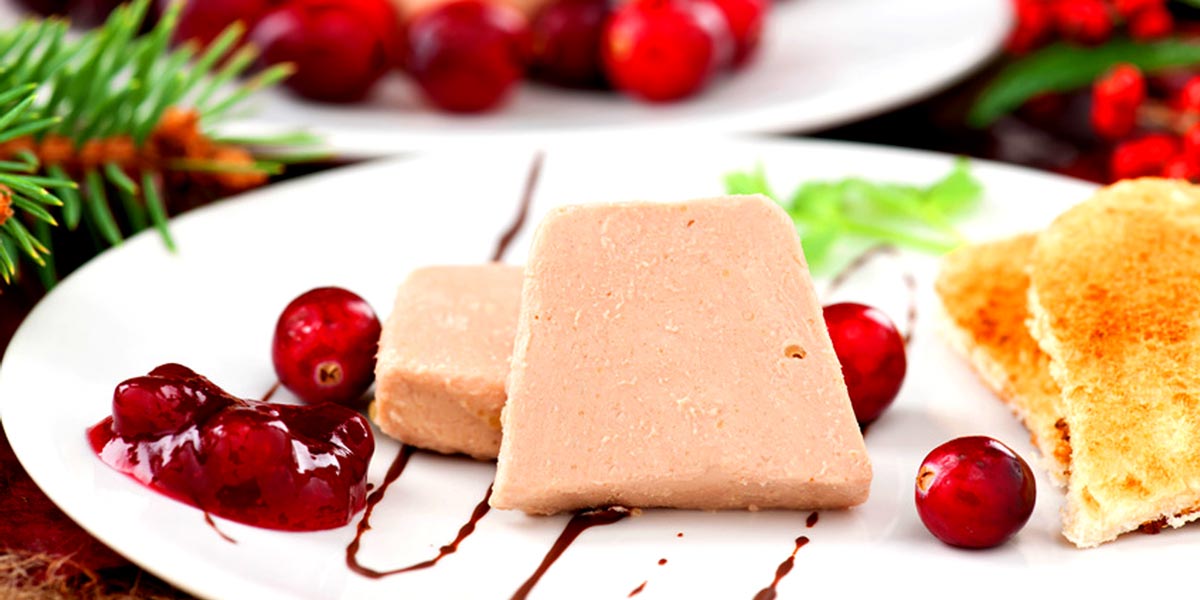

Goose liver block, goose liver mousse, duck liver block, goose liver mixed with truffles or fruits, fillet tips, rilette, duck liver entier, terrines, etc.
Rougie - Our history and our know-how
It all begins in 1875 with the opening of a workshop in Cahors, which quickly becomes the meeting point of all the region`s gourmets. Thanks to its good reputation, the company grew under the leadership of Leonce Rougie, which was later taken over by his son Jean Rougie and in 1950 expanded its international importance to over 5 continents. In 1977, Rougie moved to Sarlat, the foie gras capital in the heart of the Perigord. Rougie`s breeding and fattening art is carried out with old know-how. The art of offering a cooking method that reveals its unique characteristics. This makes a Foie Gras Rougie an incomparable dish. Which is intended for the restaurant professionals and fine food lovers around the world. The Rougie brand constantly perfects its working methods and recipes, becoming a true symbol of French gastronomy. The Rougie products made from goose liver and duck liver, as well as the lobster specialties with duck meat, are appreciated all over the world. Today Rougie is in high demand in palaces, fine restaurants, delicatessens and airlines in 65 countries.
copyright text: pro.rougie.fr
Rougie foie gras / goose foie gras / duck foie gras canned and semi-preserved

Rougie foie gras / goose foie gras / duck foie gras canned and semi-preserved
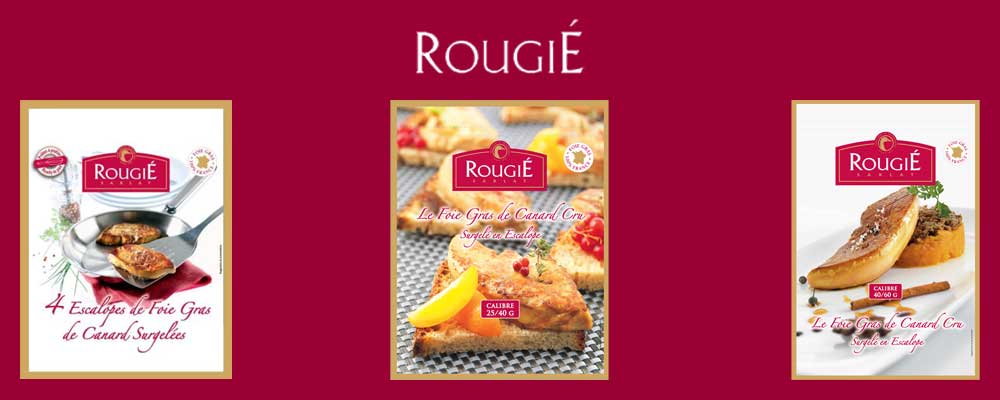
Rougie foie gras / goose foie gras / duck foie gras
Our ducklings are exclusively Mulard males of 100% French origin. The animals are kept in large stables with open access to the outdoors. The average breeding period is 10 to 11 weeks. Only 9 to 11 days are allowed for the fattening period. Euralis constantly invests in the training of its employees and producers as well as in scientific research studies.
All animals have access to fresh water and are fed balanced feed prepared by animal nutrition experts. The constant support of our producers by our technical and veterinary teams guarantees the animal breeding performance and health of our herds, as well as the welfare of the animals and respect for the environment.
copyright text: pro.rougie.fr
Rougie foie gras / goose foie gras / duck foie gras
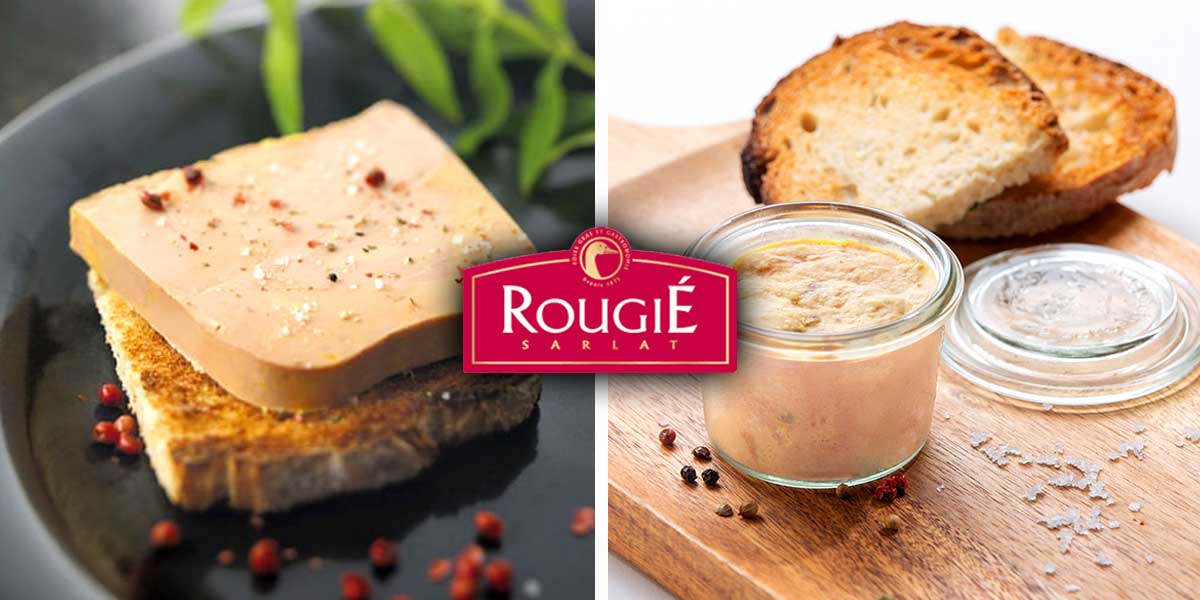
copyright photo: euralis.fr
-
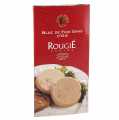
Goose liver block, 2 slices each approx. 40 g, rougie
80 g € 18,53 * (€ 231,63 / kg)
NOW AVAILABLE NOW AVAILABLE Delivery of the goods within 36 hours of order and successful payment. Please also note the information on payment and shipping.item number: 15735
NOW AVAILABLE Delivery of the goods within 36 hours of order and successful payment. Please also note the information on payment and shipping.item number: 15735
cooled product 0 ° C to + 7 ° C -

Goose liver block, 3% truffle, foie gras, trapeze, rougie
75 g € 38,18 * (€ 509,07 / kg)
NOW AVAILABLE NOW AVAILABLE Delivery of the goods within 36 hours of order and successful payment. Please also note the information on payment and shipping.item number: 15746
NOW AVAILABLE Delivery of the goods within 36 hours of order and successful payment. Please also note the information on payment and shipping.item number: 15746 -
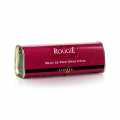
Goose liver block, 3% truffle, foie gras, trapeze, rougie
310g € 116,79 * (€ 376,74 / kg)
NOW AVAILABLE NOW AVAILABLE Delivery of the goods within 36 hours of order and successful payment. Please also note the information on payment and shipping.item number: 15748
NOW AVAILABLE Delivery of the goods within 36 hours of order and successful payment. Please also note the information on payment and shipping.item number: 15748 -
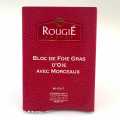
Block of goose liver, with pieces, foie gras, trapeze, semi-preserved, rougie
180g € 42,43 * (€ 235,72 / kg)
NOW AVAILABLE NOW AVAILABLE Delivery of the goods within 36 hours of order and successful payment. Please also note the information on payment and shipping.item number: 11402
NOW AVAILABLE Delivery of the goods within 36 hours of order and successful payment. Please also note the information on payment and shipping.item number: 11402
cooled product 0 ° C to + 7 ° C -

Block of goose liver, with pieces, foie gras, trapeze, semi-preserved, rougie
500g € 90,23 * (€ 180,46 / kg)
NOW AVAILABLE NOW AVAILABLE Delivery of the goods within 36 hours of order and successful payment. Please also note the information on payment and shipping.item number: 11404
NOW AVAILABLE Delivery of the goods within 36 hours of order and successful payment. Please also note the information on payment and shipping.item number: 11404
cooled product 0 ° C to + 7 ° C -

Block of goose liver, with pieces, foie gras, trapeze, semi-preserved, rougie
1 kg € 176,49 * (€ 176,49 / kg)
NOW AVAILABLE NOW AVAILABLE Delivery of the goods within 36 hours of order and successful payment. Please also note the information on payment and shipping.item number: 11405
NOW AVAILABLE Delivery of the goods within 36 hours of order and successful payment. Please also note the information on payment and shipping.item number: 11405
cooled product 0 ° C to + 7 ° C -
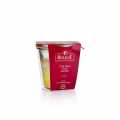
Goose liver Entier, fully preserved, Rougie
180g € 62,89 * (€ 349,39 / kg)
NOW AVAILABLE NOW AVAILABLE Delivery of the goods within 36 hours of order and successful payment. Please also note the information on payment and shipping.item number: 38165
NOW AVAILABLE Delivery of the goods within 36 hours of order and successful payment. Please also note the information on payment and shipping.item number: 38165
cooled product 0 ° C to + 7 ° C -
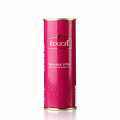
Foie gras mousse, 25% foie gras, rougie
320g € 23,84 * (€ 74,50 / kg)
NOW AVAILABLE NOW AVAILABLE Delivery of the goods within 36 hours of order and successful payment. Please also note the information on payment and shipping.item number: 11413
NOW AVAILABLE Delivery of the goods within 36 hours of order and successful payment. Please also note the information on payment and shipping.item number: 11413
cooled product 0 ° C to + 7 ° C -
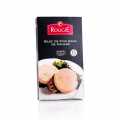
Duck foie gras block, 2 x 40g slices, rougie
80g € 15,00 * (€ 187,50 / kg)
NOW AVAILABLE NOW AVAILABLE Delivery of the goods within 36 hours of order and successful payment. Please also note the information on payment and shipping.item number: 35950
NOW AVAILABLE Delivery of the goods within 36 hours of order and successful payment. Please also note the information on payment and shipping.item number: 35950
cooled product 0 ° C to + 7 ° C -

Duck liver block, with armagnac, foie gras, rougie
210 g € 35,83 * (€ 170,62 / kg)
NOW AVAILABLE NOW AVAILABLE Delivery of the goods within 36 hours of order and successful payment. Please also note the information on payment and shipping.item number: 25927
NOW AVAILABLE Delivery of the goods within 36 hours of order and successful payment. Please also note the information on payment and shipping.item number: 25927 -

Duck foie gras mousse, 50% foie gras, rougie
320 g € 25,17 * (€ 78,66 / kg)
NOW AVAILABLE NOW AVAILABLE Delivery of the goods within 36 hours of order and successful payment. Please also note the information on payment and shipping.item number: 25930
NOW AVAILABLE Delivery of the goods within 36 hours of order and successful payment. Please also note the information on payment and shipping.item number: 25930
cooled product 0 ° C to + 7 ° C -
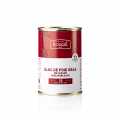
Block of duck liver, with pieces, round, semi-preserved, foie gras, rougie
400g € 61,02 * (€ 152,55 / kg)
NOW AVAILABLE NOW AVAILABLE Delivery of the goods within 36 hours of order and successful payment. Please also note the information on payment and shipping.item number: 11428
NOW AVAILABLE Delivery of the goods within 36 hours of order and successful payment. Please also note the information on payment and shipping.item number: 11428
cooled product 0 ° C to + 7 ° C -
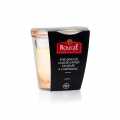
Duck foie gras, with Armagnac, Rougie
180 g € 46,42 * (€ 257,89 / kg)
NOW AVAILABLE NOW AVAILABLE Delivery of the goods within 36 hours of order and successful payment. Please also note the information on payment and shipping.item number: 15739
NOW AVAILABLE Delivery of the goods within 36 hours of order and successful payment. Please also note the information on payment and shipping.item number: 15739
cooled product 0 ° C to + 7 ° C -

Duck Foie Gras - Entier, with Champagne, Sarawak and Maniguette Pepper, Rougie
180 g € 49,79 * (€ 276,61 / kg)
NOW AVAILABLE NOW AVAILABLE Delivery of the goods within 36 hours of order and successful payment. Please also note the information on payment and shipping.item number: 15740
NOW AVAILABLE Delivery of the goods within 36 hours of order and successful payment. Please also note the information on payment and shipping.item number: 15740
cooled product 0 ° C to + 7 ° C -
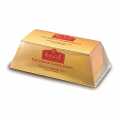
Duck foie gras, with champagne, Sarawak and Maniguette pepper, Rougie
500 g € 115,46 * (€ 230,92 / kg)
NOW AVAILABLE NOW AVAILABLE Delivery of the goods within 36 hours of order and successful payment. Please also note the information on payment and shipping.item number: 15741
NOW AVAILABLE Delivery of the goods within 36 hours of order and successful payment. Please also note the information on payment and shipping.item number: 15741
cooled product 0 ° C to + 7 ° C -
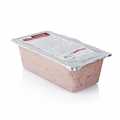
Alliance Gourmande, duck meat with 45% foie gras, spreadable, rougie
500 g € 26,49 * (€ 52,98 / kg)
NOW AVAILABLE NOW AVAILABLE Delivery of the goods within 36 hours of order and successful payment. Please also note the information on payment and shipping.item number: 30134
NOW AVAILABLE Delivery of the goods within 36 hours of order and successful payment. Please also note the information on payment and shipping.item number: 30134
cooled product 0 ° C to + 7 ° C -
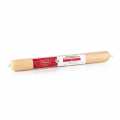
Duck liver block, stick-shaped ficelle, foie gras, Ø 36 mm, 38 cm, rougie
400 g € 33,80 * (€ 84,50 / kg)
NOW AVAILABLE NOW AVAILABLE Delivery of the goods within 36 hours of order and successful payment. Please also note the information on payment and shipping.item number: 25929
NOW AVAILABLE Delivery of the goods within 36 hours of order and successful payment. Please also note the information on payment and shipping.item number: 25929
cooled product 0 ° C to + 7 ° C -
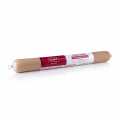
Duck foie gras mousse, in stick form, 50% foie gras, Ø 36mm, 38cm, Rougie
400 g € 31,81 * (€ 79,53 / kg)
NOW AVAILABLE NOW AVAILABLE Delivery of the goods within 36 hours of order and successful payment. Please also note the information on payment and shipping.item number: 30761
NOW AVAILABLE Delivery of the goods within 36 hours of order and successful payment. Please also note the information on payment and shipping.item number: 30761
cooled product 0 ° C to + 7 ° C -
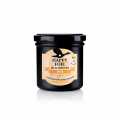
Happy Foie - duck liver block, EthicLine, ORGANIC
130 g € 19,86 * (€ 152,77 / kg)
NOW AVAILABLE NOW AVAILABLE Delivery of the goods within 36 hours of order and successful payment. Please also note the information on payment and shipping.item number: 35026
NOW AVAILABLE Delivery of the goods within 36 hours of order and successful payment. Please also note the information on payment and shipping.item number: 35026
cooled product 0 ° C to + 7 ° C
-
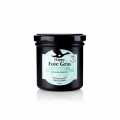
Happy Foie - Poultry Liver, EthicLine, ORGANIC
130g € 17,19 * (€ 132,23 / kg)
NOW AVAILABLE NOW AVAILABLE Delivery of the goods within 36 hours of order and successful payment. Please also note the information on payment and shipping.item number: 37501
NOW AVAILABLE Delivery of the goods within 36 hours of order and successful payment. Please also note the information on payment and shipping.item number: 37501
cooled product 0 ° C to + 7 ° C
-
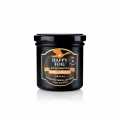
Happy Foie - Duck liver with white truffle, EthicLine, ORGANIC
130g € 27,82 * (€ 214,00 / kg)
NOW AVAILABLE NOW AVAILABLE Delivery of the goods within 36 hours of order and successful payment. Please also note the information on payment and shipping.item number: 37802
NOW AVAILABLE Delivery of the goods within 36 hours of order and successful payment. Please also note the information on payment and shipping.item number: 37802
cooled product 0 ° C to + 7 ° C
-
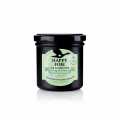
Happy Foie - free range foie gras, EthicLine
130g € 27,82 * (€ 214,00 / kg)
NOW AVAILABLE NOW AVAILABLE Delivery of the goods within 36 hours of order and successful payment. Please also note the information on payment and shipping.item number: 38166
NOW AVAILABLE Delivery of the goods within 36 hours of order and successful payment. Please also note the information on payment and shipping.item number: 38166
cooled product 0 ° C to + 7 ° C -
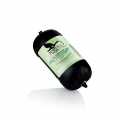
Happy Foie - free range foie gras, roll, EthicLine
250 g € 43,75 * (€ 175,00 / kg)
NOW AVAILABLE NOW AVAILABLE Delivery of the goods within 36 hours of order and successful payment. Please also note the information on payment and shipping.item number: 38168
NOW AVAILABLE Delivery of the goods within 36 hours of order and successful payment. Please also note the information on payment and shipping.item number: 38168
cooled product 0 ° C to + 7 ° C -
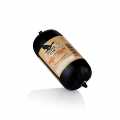
Happy Foie - Duck Liver, Roll, EthicLine, ORGANIC
250 g € 33,14 * (€ 132,56 / kg)
NOW AVAILABLE NOW AVAILABLE Delivery of the goods within 36 hours of order and successful payment. Please also note the information on payment and shipping.item number: 38169
NOW AVAILABLE Delivery of the goods within 36 hours of order and successful payment. Please also note the information on payment and shipping.item number: 38169
cooled product 0 ° C to + 7 ° C
-
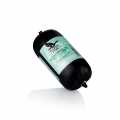
Happy Foie - Chicken Liver, Roll, EthicLine, ORGANIC
250 g € 29,79 * (€ 119,16 / kg)
NOW AVAILABLE NOW AVAILABLE Delivery of the goods within 36 hours of order and successful payment. Please also note the information on payment and shipping.item number: 38171
NOW AVAILABLE Delivery of the goods within 36 hours of order and successful payment. Please also note the information on payment and shipping.item number: 38171
cooled product 0 ° C to + 7 ° C
-
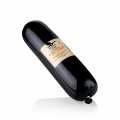
Happy Foie - Duck Liver, Roll, EthicLine, ORGANIC
500g € 66,33 * (€ 132,66 / kg)
NOW AVAILABLE NOW AVAILABLE Delivery of the goods within 36 hours of order and successful payment. Please also note the information on payment and shipping.item number: 37804
NOW AVAILABLE Delivery of the goods within 36 hours of order and successful payment. Please also note the information on payment and shipping.item number: 37804
cooled product 0 ° C to + 7 ° C
-
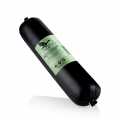
Happy Foie - free range foie gras, roll, EthicLine
500g € 79,63 * (€ 159,26 / kg)
NOW AVAILABLE NOW AVAILABLE Delivery of the goods within 36 hours of order and successful payment. Please also note the information on payment and shipping.item number: 38167
NOW AVAILABLE Delivery of the goods within 36 hours of order and successful payment. Please also note the information on payment and shipping.item number: 38167
cooled product 0 ° C to + 7 ° C -
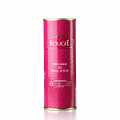
Foie gras mousse, 50% foie gras, rougie
320g € 23,84 * (€ 74,50 / kg)
NOW AVAILABLE NOW AVAILABLE Delivery of the goods within 36 hours of order and successful payment. Please also note the information on payment and shipping.item number: 11414
NOW AVAILABLE Delivery of the goods within 36 hours of order and successful payment. Please also note the information on payment and shipping.item number: 11414
cooled product 0 ° C to + 7 ° C -
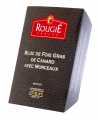
Block of duck liver, with pieces, trapezoid, semi-preserved, foie gras, rougie
180g € 30,47 * (€ 169,28 / kg)
NOW AVAILABLE NOW AVAILABLE Delivery of the goods within 36 hours of order and successful payment. Please also note the information on payment and shipping.item number: 11427
NOW AVAILABLE Delivery of the goods within 36 hours of order and successful payment. Please also note the information on payment and shipping.item number: 11427
cooled product 0 ° C to + 7 ° C -
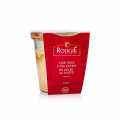
Goose liver - Entier, in port wine jelly, 100% Foie Gras, semi-preserved, Rougie
180g € 57,03 * (€ 316,83 / kg)
NOW AVAILABLE NOW AVAILABLE Delivery of the goods within 36 hours of order and successful payment. Please also note the information on payment and shipping.item number: 11435
NOW AVAILABLE Delivery of the goods within 36 hours of order and successful payment. Please also note the information on payment and shipping.item number: 11435
cooled product 0 ° C to + 7 ° C -
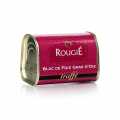
Goose liver block, 3% truffle, foie gras, trapeze, rougie
145 g € 58,37 * (€ 402,55 / kg)
NOW AVAILABLE NOW AVAILABLE Delivery of the goods within 36 hours of order and successful payment. Please also note the information on payment and shipping.item number: 15747
NOW AVAILABLE Delivery of the goods within 36 hours of order and successful payment. Please also note the information on payment and shipping.item number: 15747 -
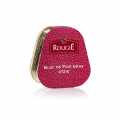
Foie gras block, foie gras, trapeze, half preserve, rougie
75 g € 25,53 * (€ 340,40 / kg)
NOW AVAILABLE NOW AVAILABLE Delivery of the goods within 36 hours of order and successful payment. Please also note the information on payment and shipping.item number: 15749
NOW AVAILABLE Delivery of the goods within 36 hours of order and successful payment. Please also note the information on payment and shipping.item number: 15749 -
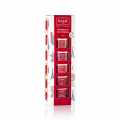
Rougie terrine gift set, 6 different duck dishes
390 g, 6 x 65g € 20,23 * (€ 51,87 / kg)
NOW AVAILABLE NOW AVAILABLE Delivery of the goods within 36 hours of order and successful payment. Please also note the information on payment and shipping.item number: 35022
NOW AVAILABLE Delivery of the goods within 36 hours of order and successful payment. Please also note the information on payment and shipping.item number: 35022
cooled product 0 ° C to + 7 ° C -
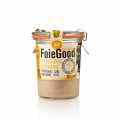
Duck liver pate / spread, FoieGood (without stopper)
120g € 25,65 * (€ 213,75 / kg)
NOW AVAILABLE NOW AVAILABLE Delivery of the goods within 36 hours of order and successful payment. Please also note the information on payment and shipping.item number: 39195
NOW AVAILABLE Delivery of the goods within 36 hours of order and successful payment. Please also note the information on payment and shipping.item number: 39195 -
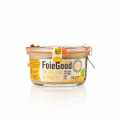
Duck Rillette, FoieGood
115g € 18,53 * (€ 161,13 / kg)
NOW AVAILABLE NOW AVAILABLE Delivery of the goods within 36 hours of order and successful payment. Please also note the information on payment and shipping.item number: 39196
NOW AVAILABLE Delivery of the goods within 36 hours of order and successful payment. Please also note the information on payment and shipping.item number: 39196
cooled product 0 ° C to + 7 ° C -
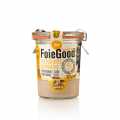
Duck liver pate / spread, with porcini mushrooms, FoieGood (without stopper)
120g € 27,12 * (€ 226,00 / kg)
NOW AVAILABLE NOW AVAILABLE Delivery of the goods within 36 hours of order and successful payment. Please also note the information on payment and shipping.item number: 39197
NOW AVAILABLE Delivery of the goods within 36 hours of order and successful payment. Please also note the information on payment and shipping.item number: 39197 -
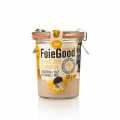
Duck liver, (without stopper) spread with truffle, FoieGood
120g € 28,37 * (€ 236,42 / kg)
NOW AVAILABLE NOW AVAILABLE Delivery of the goods within 36 hours of order and successful payment. Please also note the information on payment and shipping.item number: 39198
NOW AVAILABLE Delivery of the goods within 36 hours of order and successful payment. Please also note the information on payment and shipping.item number: 39198 -
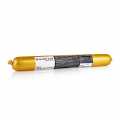
Happy Foie - Finesse goose liver mousse, EthicLine
300 g € 21,64 * (€ 72,13 / kg)
NOW AVAILABLE NOW AVAILABLE Delivery of the goods within 36 hours of order and successful payment. Please also note the information on payment and shipping.item number: 40789
NOW AVAILABLE Delivery of the goods within 36 hours of order and successful payment. Please also note the information on payment and shipping.item number: 40789
cooled product 0 ° C to + 7 ° C -
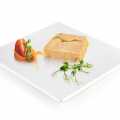
Duck foie gras block, foie gras, with fig, trapezoidal shell, rougie
180 g € 30,01 * (€ 166,72 / kg)
NOW AVAILABLE NOW AVAILABLE Delivery of the goods within 36 hours of order and successful payment. Please also note the information on payment and shipping.item number: 41634
NOW AVAILABLE Delivery of the goods within 36 hours of order and successful payment. Please also note the information on payment and shipping.item number: 41634
cooled product 0 ° C to + 7 ° C -
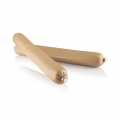
Duck liver - spread (pate), without stopper, stick, FoieGood
500 g, 2 x 250g € 35,66 * (€ 71,32 / kg)
NOW AVAILABLE NOW AVAILABLE Delivery of the goods within 36 hours of order and successful payment. Please also note the information on payment and shipping.item number: 41635
NOW AVAILABLE Delivery of the goods within 36 hours of order and successful payment. Please also note the information on payment and shipping.item number: 41635
cooled product 0 ° C to + 7 ° C -
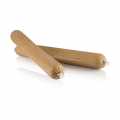
Duck liver spread (pate), with truffle, without stopper, FoieGood
500 g, 2 x 250g € 45,06 * (€ 90,12 / kg)
NOW AVAILABLE NOW AVAILABLE Delivery of the goods within 36 hours of order and successful payment. Please also note the information on payment and shipping.item number: 41636
NOW AVAILABLE Delivery of the goods within 36 hours of order and successful payment. Please also note the information on payment and shipping.item number: 41636
cooled product 0 ° C to + 7 ° C -
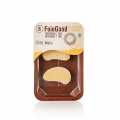
Duck liver - slices for frying, without stopper, 2 slices, FoieGood
60 g € 13,15 * (€ 219,17 / kg)
NOW AVAILABLE NOW AVAILABLE Delivery of the goods within 36 hours of order and successful payment. Please also note the information on payment and shipping.item number: 41637
NOW AVAILABLE Delivery of the goods within 36 hours of order and successful payment. Please also note the information on payment and shipping.item number: 41637
frozen product -18 ° C -
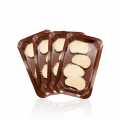
Duck liver - slices for frying, without stopper, 16 slices, FoieGood
480 g € 76,10 * (€ 158,54 / kg)
NOW AVAILABLE NOW AVAILABLE Delivery of the goods within 36 hours of order and successful payment. Please also note the information on payment and shipping.item number: 41638
NOW AVAILABLE Delivery of the goods within 36 hours of order and successful payment. Please also note the information on payment and shipping.item number: 41638
frozen product -18 ° C -
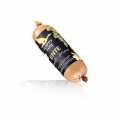
Happy Foie - Duck liver with Amalfi lemon, roll, EthicLine
100 g € 13,29 * (€ 132,90 / kg)
NOT AVAILABLE Currently not available. When this product will be available is not known. Please also note the information on payment and shipping.item number: 41639
Currently not available. When this product will be available is not known. Please also note the information on payment and shipping.item number: 41639
cooled product 0 ° C to + 7 ° C







